Justice Forward
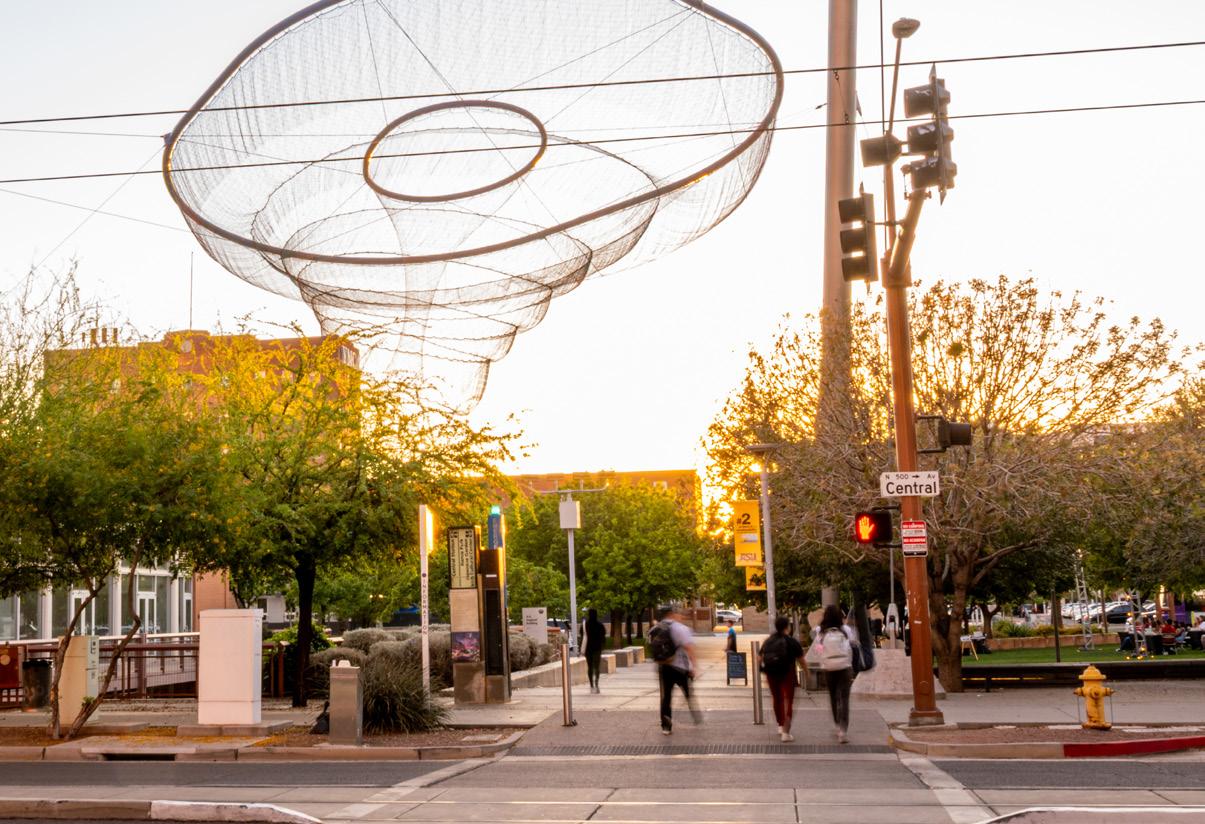
ASU’s commitment to safer communities – from the West, for the world


ASU’s commitment to safer communities – from the West, for the world
The criminal justice system touches all of our lives and communities — whether we realize it or not.
According to nonpartisan law and policy group Brennan Center for Justice, nearly one in three Americans — close to 80 million people — has a criminal record. That’s roughly the same number of people in our country who have a four-year college diploma.
The legal system is also a major economic driver, employing millions of people from 911 operators and first responders to corrections officers and prosecutors.
More than one million Americans are incarcerated today, the largest number of any country in the world, and most of them will one day rejoin communities outside of prison.
The system doesn’t just affect the lives of those directly involved in it. The effects ripple through their families and communities, impacting the sense of health and safety in our country as a whole.
Our justice system faces significant challenges that threaten safety and justice across America—and it is critical that we work together toward accessible, sustainable safety for all communities.
Inequitable outcomes for people facing poverty, a dwindling trust in the safety of our
communities and in public safety officials, and antiquated, expensive practices hold us back from becoming the safe and just society we have the potential to be. What would it take to create a future with less recidivism after incarceration, less stress and trauma for those living and working in the system and their communities, and less crime overall? We can have trust in the institutions meant to protect all of us and the wellbeing that defines true safety — if we build them together.
We all need, and deserve, safety for our families and communities. Realizing this vision will require a tremendous and complex effort. It will take a coordinated, multi-pronged strategy, convening perspectives across regions, experiences and ideologies. We must fundamentally rethink criminal justice practices and address the risks posed by the current culture to the people working and living in the system. By working across disciplines to advance system-level change, we will produce tangible, collaborative next steps.
Forward is our chance to build a better, safer future for all of us.
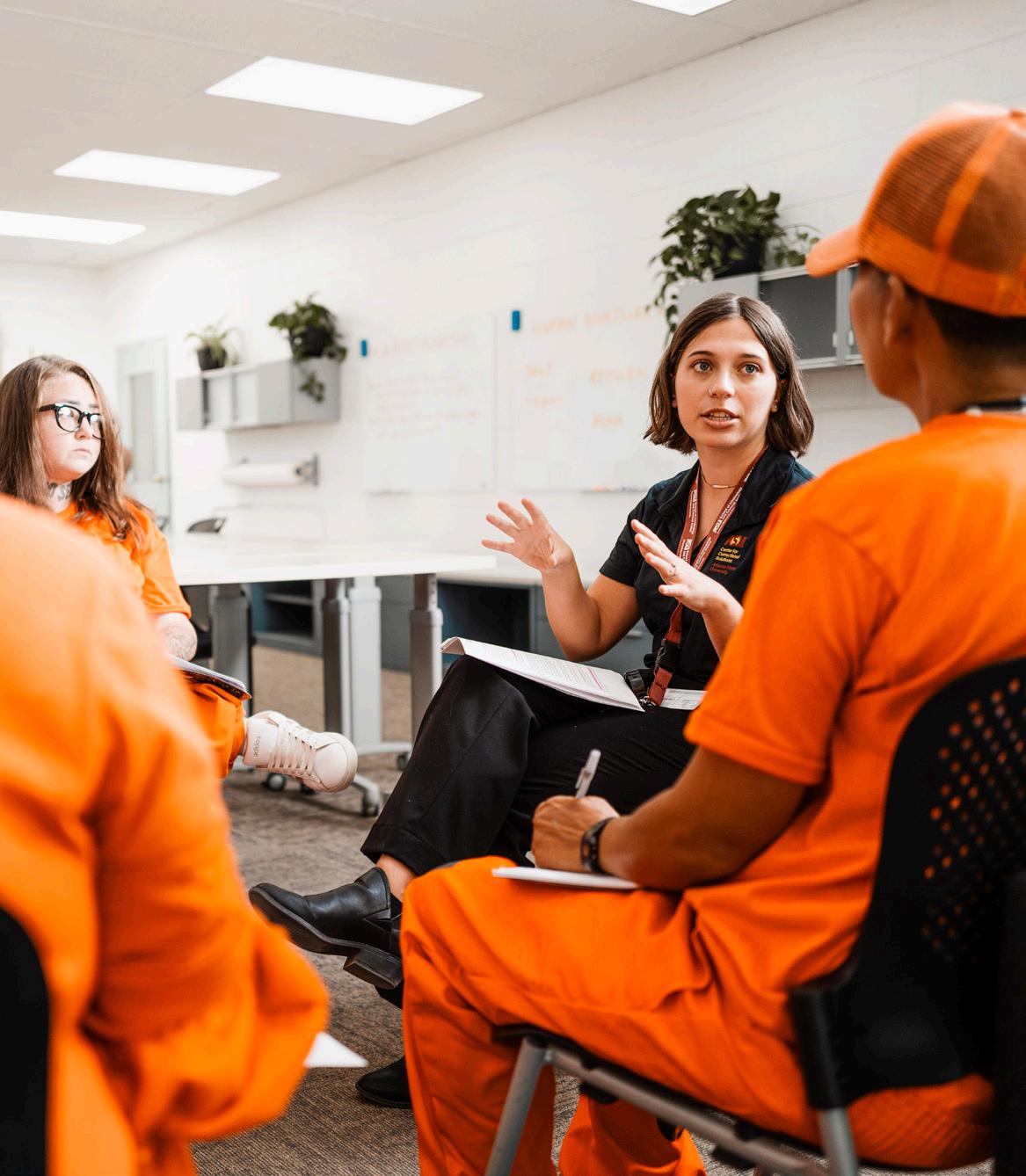
Maddie Boersma, a criminology and criminal justice PhD student, facilitates a group activity for incarcerated individuals at the Arizona State Prison Complex Perryville, located in Goodyear, Arizona.
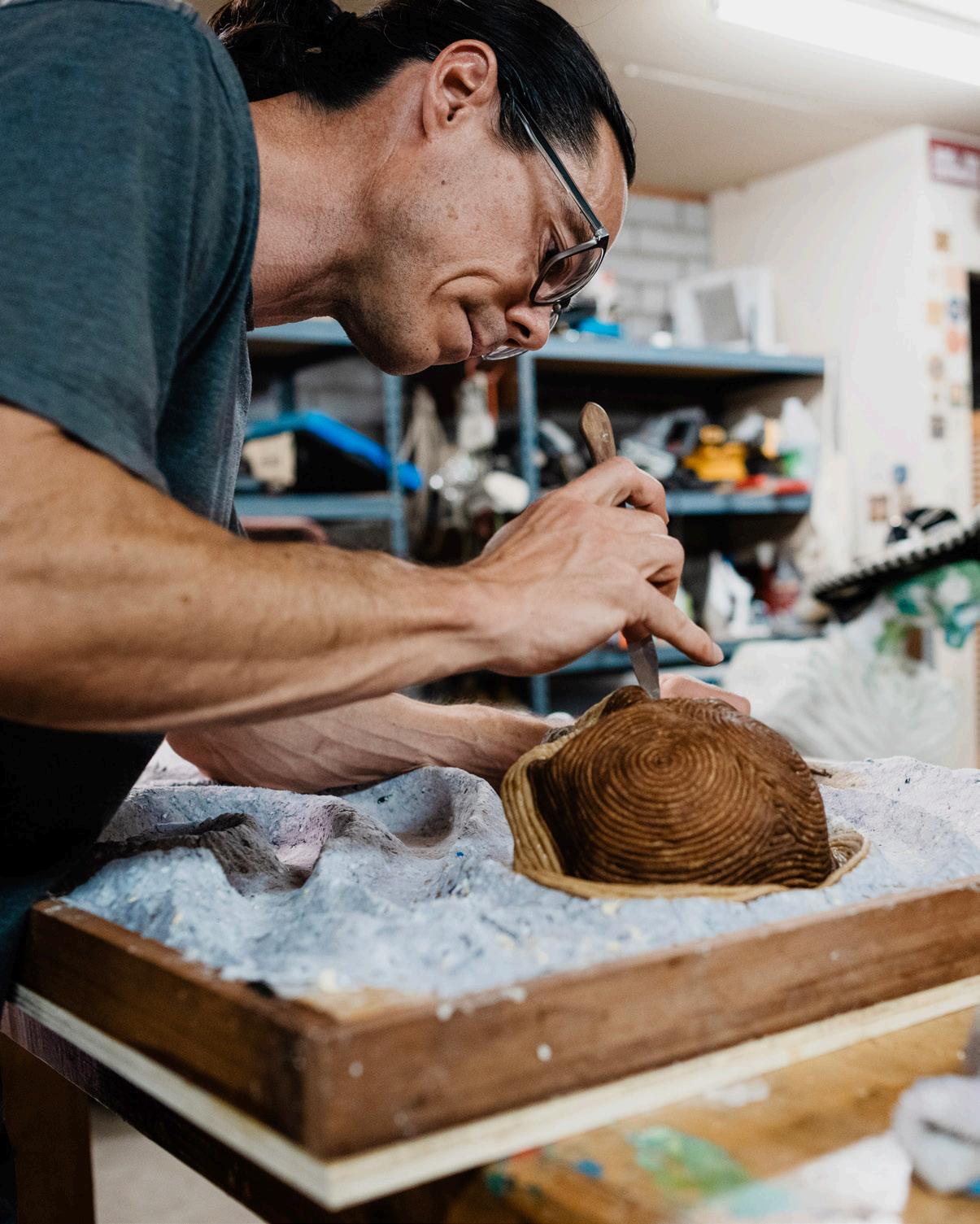
Using techniques he learned while incarcerated, Jason L. crafts an original mixed-media sculpture. He displayed his art at ASU’s {Ink}arcerated: Creativity Within Confinement show in June 2025.
Across the country, law enforcement agencies, correctional facilities, government officials and researchers strive to respond to problems in the criminal justice system. But too often, this important work occurs in regional silos — lacking accessible, applicable best practices or consistent measures of impact.
ASU is poised and fundamentally driven to address these challenges.
The university is built to generate and share collaborative solutions rooted in the values laid out in our charter. At the forefront of driving real change for real people, we turn research and ideas into action. By focusing on the reality of the justice system today, as well as what we know it can be, we aim to help our country and its communities achieve safety and the benefits it makes possible — starting here in Arizona.
Within the Watts College of Public Service and Community Solutions, a comprehensive public service college, the School of Criminology and Criminal Justice is home to one of the country’s top-ranked graduate programs. Through innovative research and a commitment to tackling challenges head-on, we convene experts and collaborate with communities to uncover solutions to society’s thorniest problems. Through Changing Futures, we will leverage collective expertise and lived experiences to craft solutions together, building the communities in which we want to live.
This work will require collective ingenuity from all angles, at an unprecedented scale. It’s just the kind of pressing problem the New American University was built to take on. Through the power of your support for Changing Futures, we will advance solutions for the public good and activate healthier communities — spreading from our state to the whole of the American West, to comprehensive change at a national scale.
Now is the time to take bold, collaborative action that will move justice forward in our country in the years and decades to come. And Arizona State University is the place to bring transformative solutions to life.
We all want to feel safe, and true safety goes beyond the absence of crime to a deep sense of wellbeing that brings communities together and changes futures for the better.
The baseline of community safety may look different in urban and rural areas, or across regions of our country. But it’s something we can all work toward — a foundation from which every community can flourish and provide for its residents.
To make real change, we must look beyond our current approach to criminal justice. Together, we can reimagine what public safety could look like in the future.
The ASU Center for Safe Communities will lead a multi-pronged strategy that centers on safety and justice. It will consider the perspectives of people most impacted by the system and its inequities and develop solutions that work for the long term.
Led by director Beth Huebner, the center will leverage ASU’s assets to bring about sustainable change in the U.S. criminal legal system and the public safety workforce. This work will unite stakeholders across disciplines — at
ASU and beyond — to examine the system through the lenses of those most affected and to collaborate on forging a path forward.
The center will focus on creating scalable, sustainable programs across key impact areas: research, evaluation, education, training and policy. By addressing root causes, its work has immense and far-reaching potential to make our system fairer, more effective and less costly.
Ensuring that neighborhoods and workplaces are safe for all. Helping people transition from incarceration back to their communities better equipped to succeed. Inspiring and training those who will shape the future of the system.
This is the work of the ASU Center for Safe Communities — work that will benefit all of us.
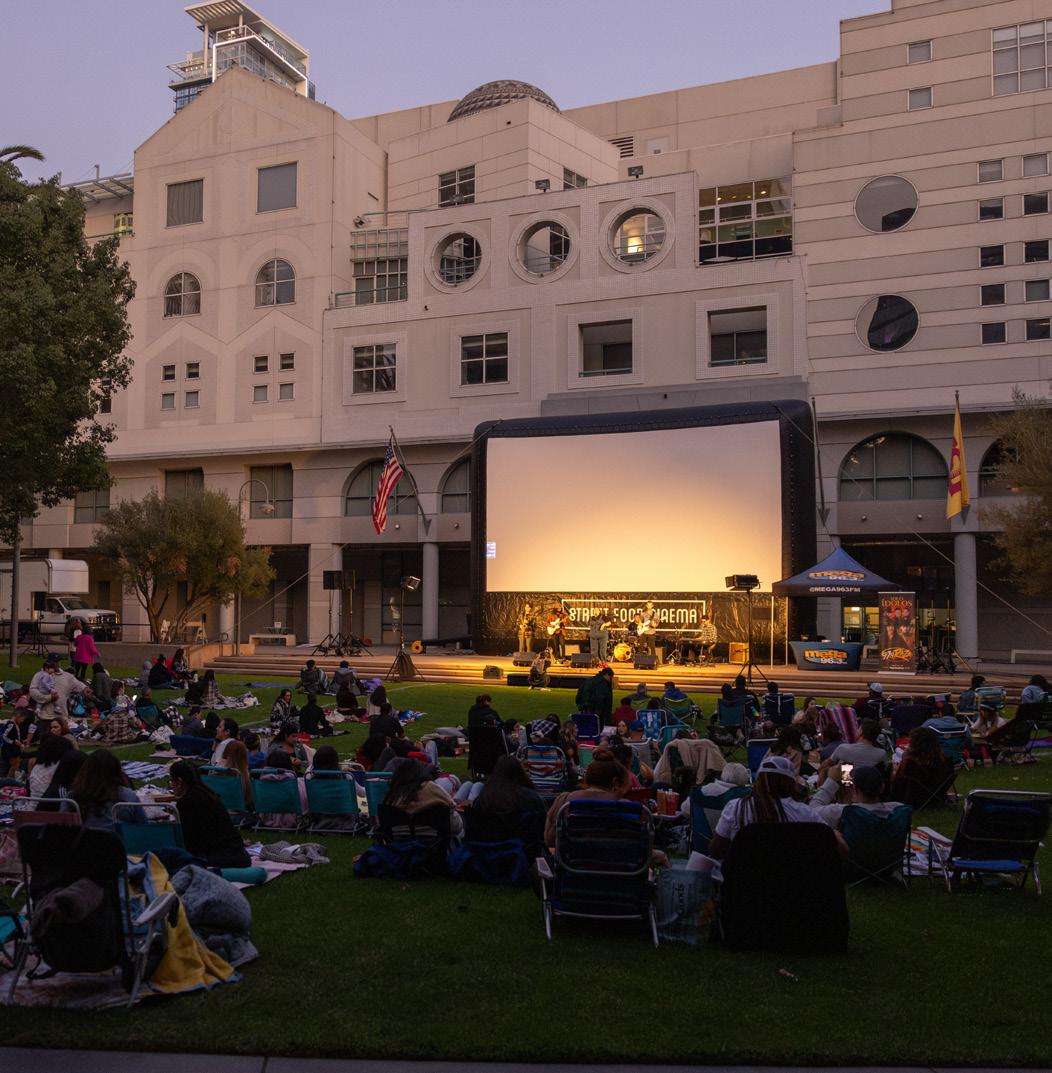
Community members gather for an outdoor concert and movie screening on the lawn at Grand Hope Park, outside of the ASU California Grand Center in Los Angeles.
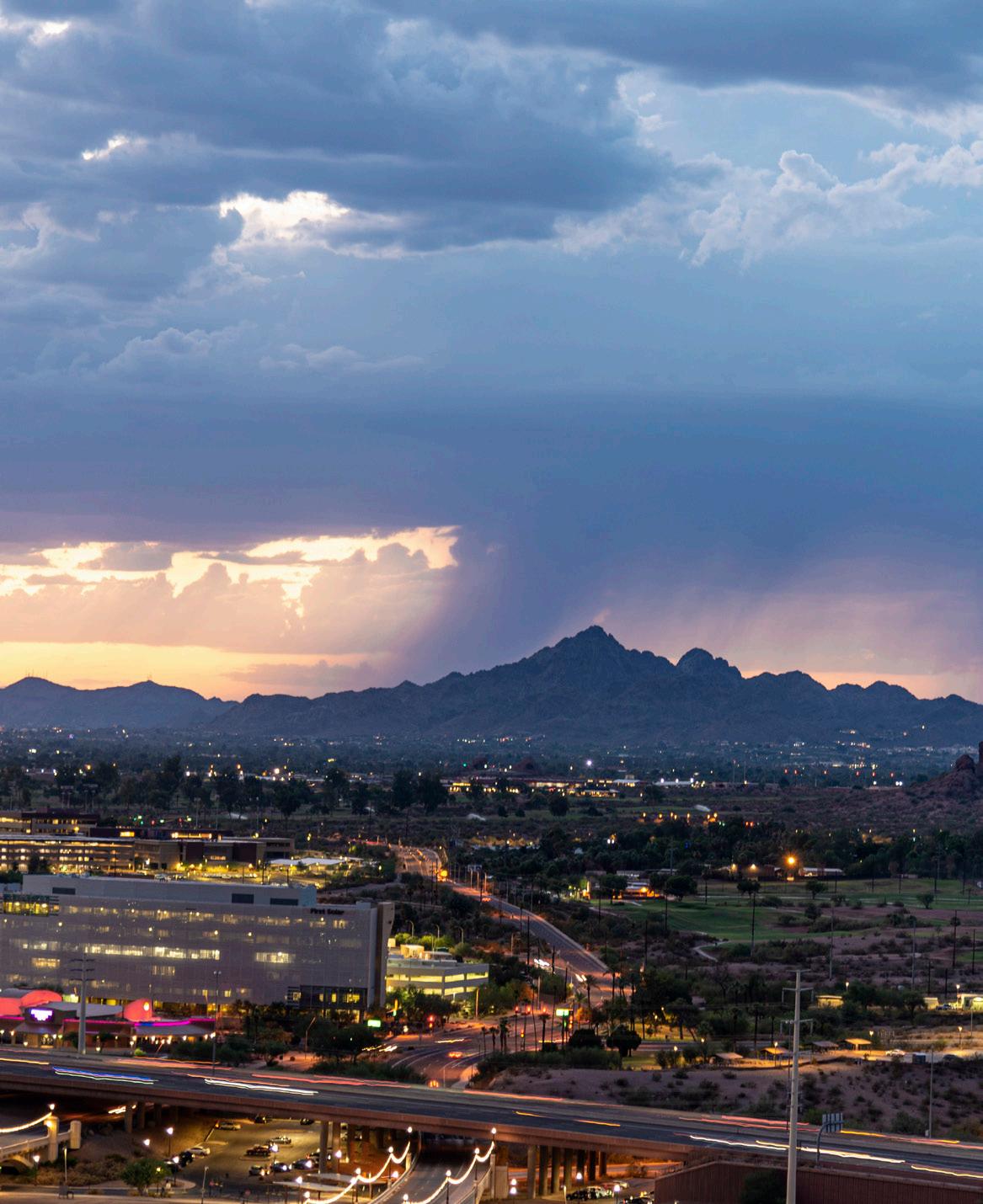
With sprawling geographic distances and a mix of urban and rural communities, the Western United States creates unique challenges for public safety leaders.
The Western United States faces challenges as unique and varied as its vast topography. Wide geographic distances, rugged terrain, water insecurity and extreme temperatures all add complexity — as do the region’s diverse needs and cultural norms.
As more public safety leaders see their communities’ needs go unaddressed by standard practices and policies, the ASU Center for Safe Communities seeks to incorporate Western needs into the safety landscape locally and beyond.
By developing strategies for the West — in the West — we can create practices that reflect the region’s unique realities and its diverse definitions of safety.
In some communities, carrying a legal firearm can heighten a sense of safety. In others, it can create fear. Every community has its own needs, requiring tailored approaches and tangible best practices.
The Western Alliance for Justice will connect a network of experts from across Western legal systems to share ideas and build peer-led solutions together. By expanding research and innovation and inviting regional agencies to engage with ASU as a trusted convener, we can test new models, gather real data and build effective policies to share across regions.
The ASU Center for Safe Communities is already working in partnership with local law enforcement agencies to address emerging issues and test best practices across focus areas, including:
• Opioid and harm reduction interventions
• Alternatives to traditional police responses
• Culture and climate changes in correctional institutions
• Virtual education for juvenile justice facilities
• Holistic school safety
• Trauma-informed support for system-impacted families
• “Right-sizing” jails, detention centers and pretrial population
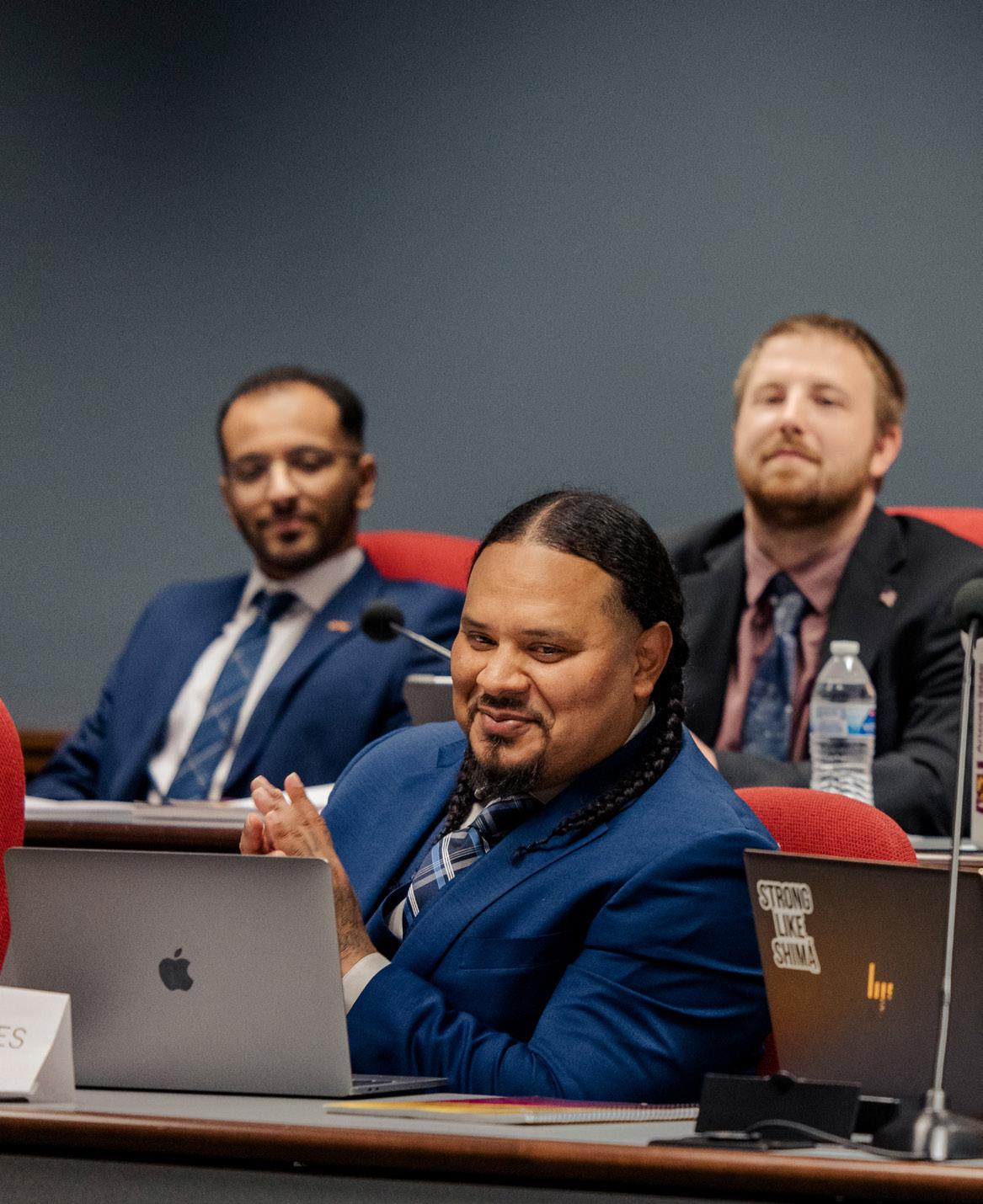
Cordero Holmes, center, a graduate student pursuing dual master’s degrees in criminology and criminal justice and public administration, joins fellow MPA classmates in hands-on training at the State Capitol to gain insight into public policy. Holmes also mentors and trains youths impacted by the justice system.

As a designated Hispanic-serving Institution with the largest number of Indigenous students in Arizona, situated in a region with significant Latinx and Native populations, we can amplify the voices and needs of communities that are underrepresented in policy decisions. We can translate scientific research into accessible best practices that fit real scenarios. And we can give ASU students who might never have set foot in Washington, D.C., exposure to people enacting the legal framework that may define their own lives and careers. ASU is ready to bring more people and perspectives to the table to catalyze effective solutions.
Our drive to include Western needs in the safety and justice conversation does not stop at regional impact. To make the case for prioritizing the needs of a wider swath of the country, we need access to people working toward legislative and policy solutions.
With additional resources, the Center for Safe Communities can bring ASU faculty and students to regular congressional briefings in our nation’s capital. There, they will educate decision-makers about Western communities, share the important work our experts and emerging changemakers are doing and pave the way for the center’s work to be implemented on a larger scale.
Through Changing Futures, you can help advance safety that’s relevant and sustainable — in the West and across the nation. Building on ASU’s commitment to create real change in our own backyard and scale solutions to drive widespread impact, we can bring evidence-based answers and innovative ideas from our region to the national stage.
With your support, we will change futures and drive justice forward — from Arizona, for the world.
The ASU Center for Safe Communities will focus not only on the safety and wellbeing of our region and country today, but on the people who will lead and live in them tomorrow.
As more people choose to leave the criminal justice workforce and fewer people seek to join public sector roles, critical gaps threaten the welfare of many communities. The Watts College is a proven leader in inspiring learners to enthusiastically seek public service careers—and in making those careers attainable. The Center for Safe Communities is committed to building a modern workforce made up of the informed, adaptable public safety professionals our country needs.
The Future Leaders Network will blend criminal justice and leadership in an innovative curriculum, provide funding for master’s degrees and offer internship opportunities. This program will help carve out accessible, appealing career paths—and build a thriving talent pipeline of leaders that reflect the communities they will serve.
Changing Futures creates opportunities to support tomorrow’s community safety workforce through the Future Leaders Network. Your investment helps expand scholarships and provide shadowing, mentorship and internship experiences that prepare students for their careers — cultivating a new generation of public safety leaders.
The center is committed to reaching learners interested in or already working in criminal justice and community safety at all experience levels. It’s programs include executive education, degree options, training for public safety professionals, leadership development and help for those exploring new careers.
Building on the experience, expertise and new ideas that have put ASU at the forefront of innovation and impact, the Center for Safe Communities is developing solutions and expanding access. We’re ready to prepare and inspire the future leaders who will keep our communities healthy and safe.
An awarded Navy veteran, Miryam Valdivia Romero graduates in May 2019 with a bachelor’s degree in criminology and criminal justice from the Watts College of Public Service and Community Solutions.
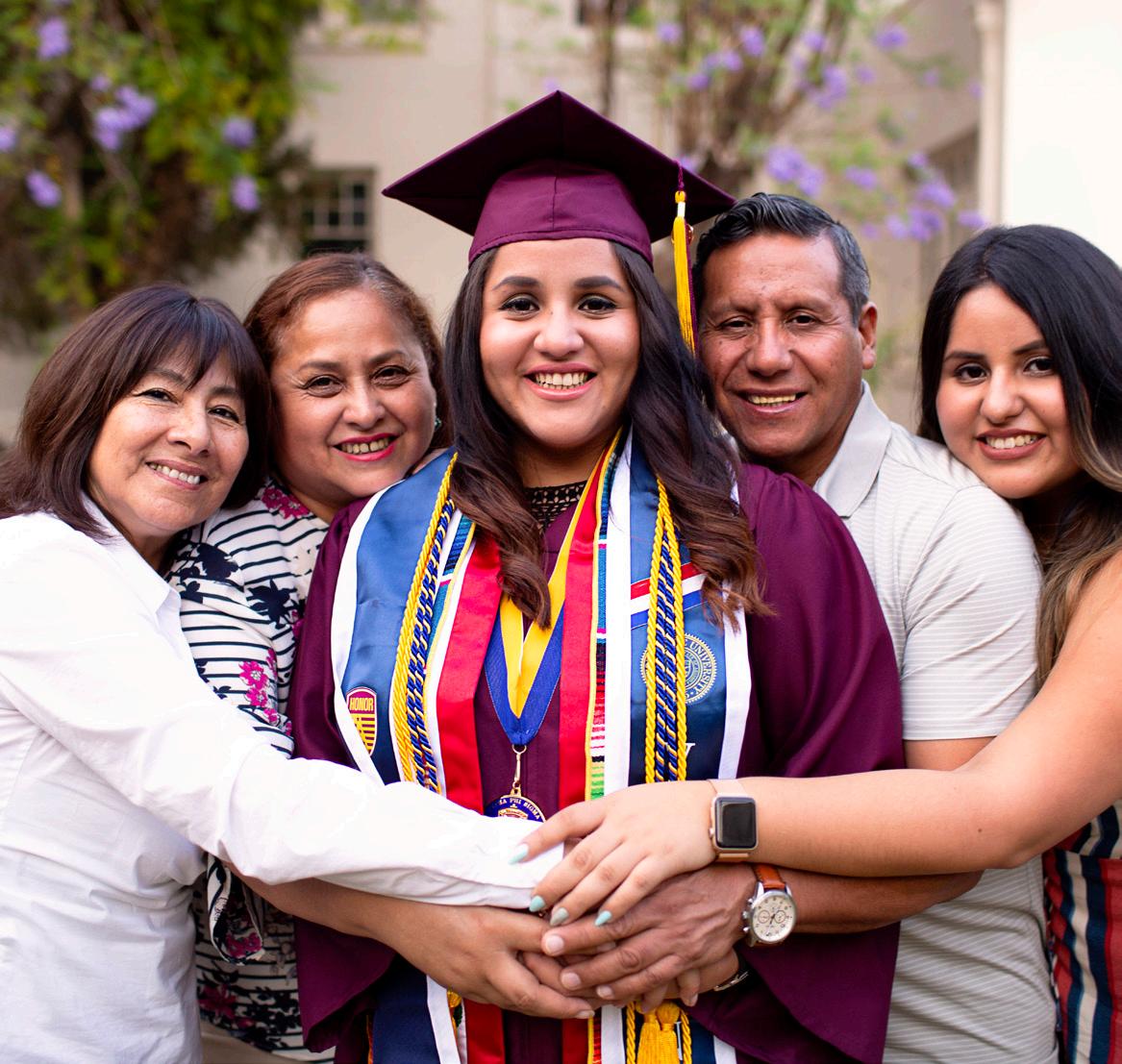
The ASU Center for Safe Communities is already hard at work creating pathways to public service careers and professional development.
• Professional Doctorate of Criminal Justice: one of the nation’s first doctorate programs of its kind at a public university, providing an accessible option for working professionals to advance their careers.
• Updated School of Criminology and Criminal Justice undergraduate and graduate curricula: incorporating ethics and technology, and focused on leadership, real-world experience and authentic perspectives.
• Local Advisory Council: engaging regional leaders to provide input on students’ career readiness, help inform ASU’s curriculum and research, connect students with opportunities and collaborate on pressing community concerns.
is uniquely positioned in creating a safer, through research, hands-on learning classrooms and communities.
—Beth Huebner Director of the School of Criminology and Criminal Justice and Watts Endowed Professor of Public Safety
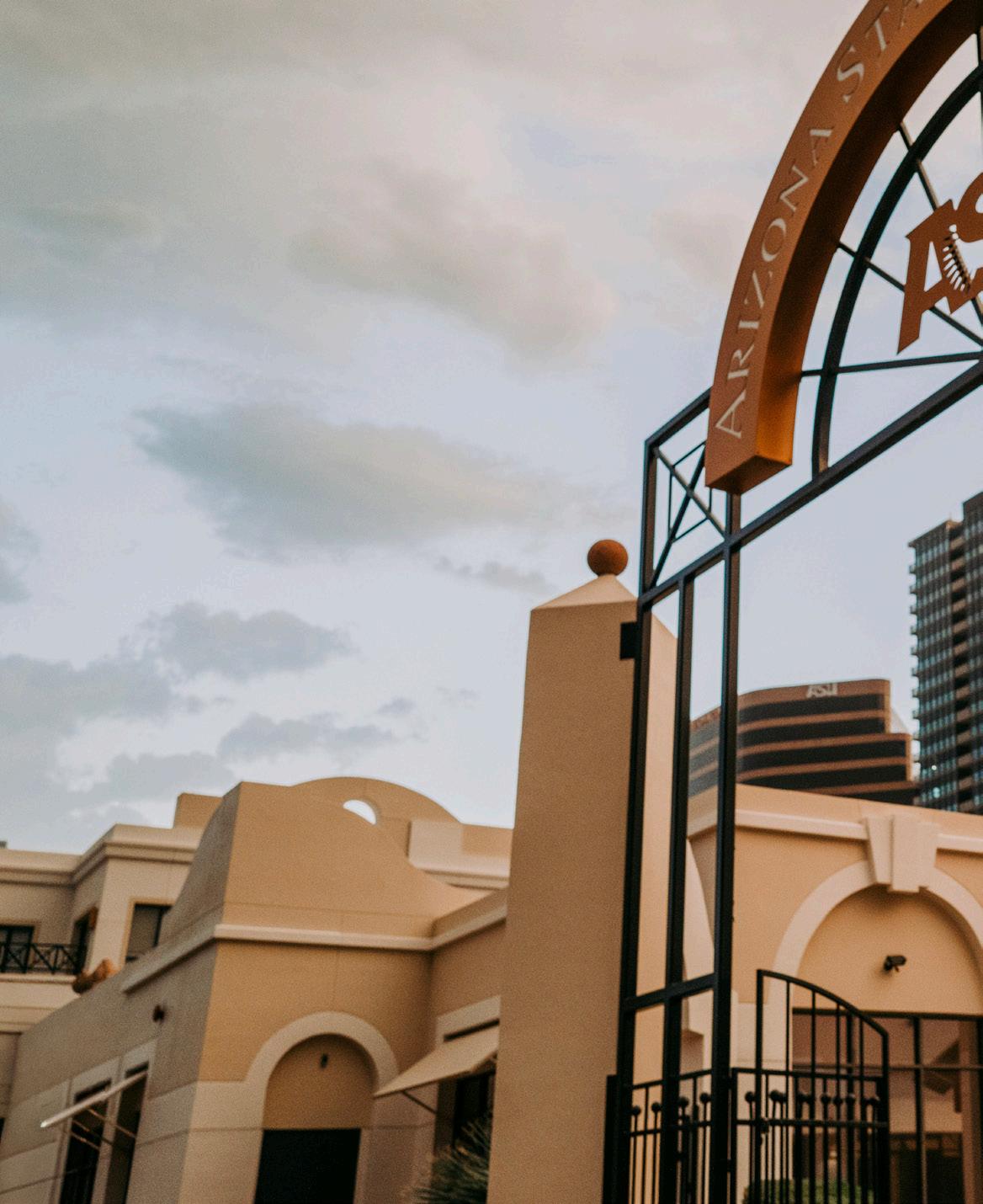
Through Changing Futures, Justice Forward offers opportunities to advance the vision of transforming the criminal legal system and cultivating public safety across an array of impact areas. We invite you to be a part of the solutions that will define justice and safety in our country — and to help fuel the impact we can achieve, together.
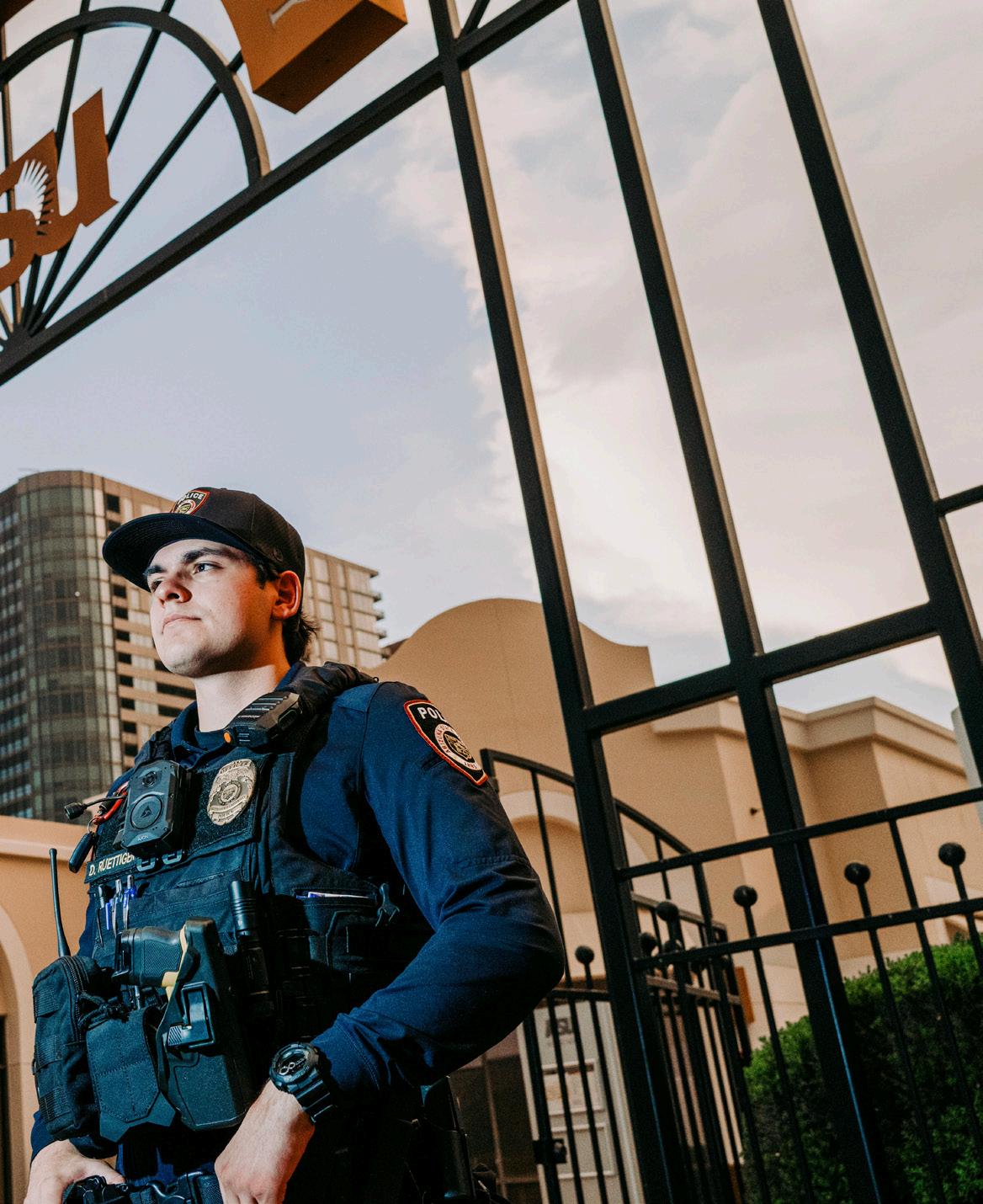
Danny Ruettiger, ’25 BS in criminology and criminal justice, patrols ASU’s downtown campus as an officer in the ASU Police Department.
As many public safety leaders approach retirement, ASU Center for Safe Communities will work to address a growing leadership gap and cultivate an expanded, engaged mid-career workforce by evaluating current practices and offering learning opportunities for the legal workforce. Equipping those in public safety positions with the evidencebased tools they need to promote community safety in modern society — and feel safe at work themselves — will improve outcomes for all.
We will advance best practices and policies that cultivate wellbeing by considering both universal definitions of safety and regional nuances. The Western Alliance for Justice will lead the effort to develop inclusive, communitydriven policies tailored to the West’s distinct geographic, cultural and political landscape. Congressional briefings with ASU faculty and students will bring these regional innovations to a broader scale.
The next generation of leaders and professionals in the criminal legal system will be key to its success and continued evolution. We must provide them with the resources and opportunities that prepare them to join and innovate the community safety workforce of tomorrow.
The Future Leaders Program will reimagine leadership development through an innovative curriculum that incorporates criminal justice and leadership training. By providing funding, practical learning and development opportunities, this program will make safety and justice careers accessible and build a prepared, engaged workforce that is ready to serve.
Expanded executive education and practical training opportunities will enable emerging and seasoned public safety professionals to grow in their careers, develop new skills to respond to a changing context and promote safety for all.
The health and safety of all members of the criminal justice community — whether public safety officials, people in incarceration or families and communities impacted by the system — is deeply integrated into the work we are doing.
The Center for Correctional Solutions is a leader in the effort to enhance the lives of people living and working in our correctional system. Alongside a variety of system-impacted stakeholders, this center works to develop a just approach to corrections and healthier futures across the corrections community. Our ASU POINT (Potential, Opportunity, Investment, Nurture, Transformation) model informs the work, rooted in the responsibility for the overall health of communities as laid out in the ASU Charter.
The {Ink}arcerated program provides creative outlets and opportunities for those who are incarcerated. Faculty and students across departments engage with people living in incarceration by providing stress management workshops, prison medical care and trauma-informed physical spaces. All work in the Center for Correctional Solutions aims to repair harm, empower both the workforce and those in incarceration, and promote public health and safety.
The ASU Center for Safe Communities will also partner with ASU Health to improve outcomes throughout the criminal justice system. One key area of focus is the impact of stress — from its effects on personal well being, families and even the lifespans of those working in criminal justice, to the trauma experienced by individuals and families affected by incarceration and criminal records. The nuances of how people on the autism spectrum or with mental health issues interact with law enforcement continue to be a pressing concern, as do the needs of incarcerated individuals who have lacked consistent health care.
In order to change the culture of the criminal justice system in our country and to enable people impacted by the system to thrive alongside their communities, we must provide learning opportunities designed to help everyone succeed.
The Inside-Out Prison Exchange Program offers a singular experience for both “outside” ASU students and an equal number of students living “inside” incarceration. Working through the same curriculum together, all students learn about the justice system from all angles. Expanding Inside-Out will offer unique benefits to more people and broaden opportunities to educate people living, working and planning to work in the criminal justice system.
We will continue to work across units at ASU to advance education programs for people in incarceration and those building out their lives postincarceration or amid the impacts of a criminal record. Education benefits both individuals and communities, offering access to opportunities and healthier futures. By reducing barriers to access and meeting all learners where they are with a trauma-informed approach, we will cultivate learning opportunities that welcome justiceimpacted students and help them thrive.
Building on our work to develop one of the nation’s first Professional Doctorate of Criminal Justice programs and update the undergraduate and graduate curricula in the School of Criminology and Criminal Justice, we will continue to expand the best-in-class education we offer and make it more accessible. Together, we can equip emerging public safety workers at all levels with evidence-based best practices and the skills needed to drive change in the legal system.
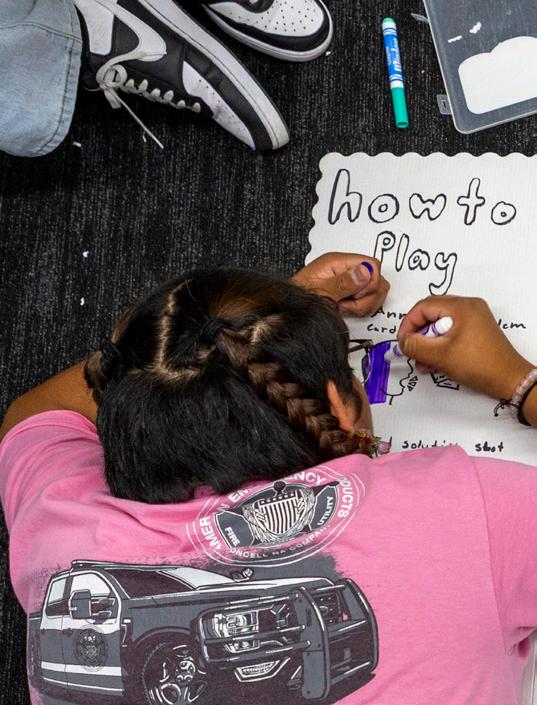
By leveraging rapidly evolving technology, we can use data to improve practices and outcomes. Advances in AI will allow us to examine resources like body camera footage and 911 call logs at speed and at scale, simplify the process of connecting people in crisis to mental health professionals, and model and test innovative solutions that can improve careers and save lives.
Native American students participate in an Access ASU Summer Program, hosted by ASU’s Office of American Indian Initiatives in June 2025. Facilitated by Watts College instructors, the students created an interactive game to explore public service and safety.
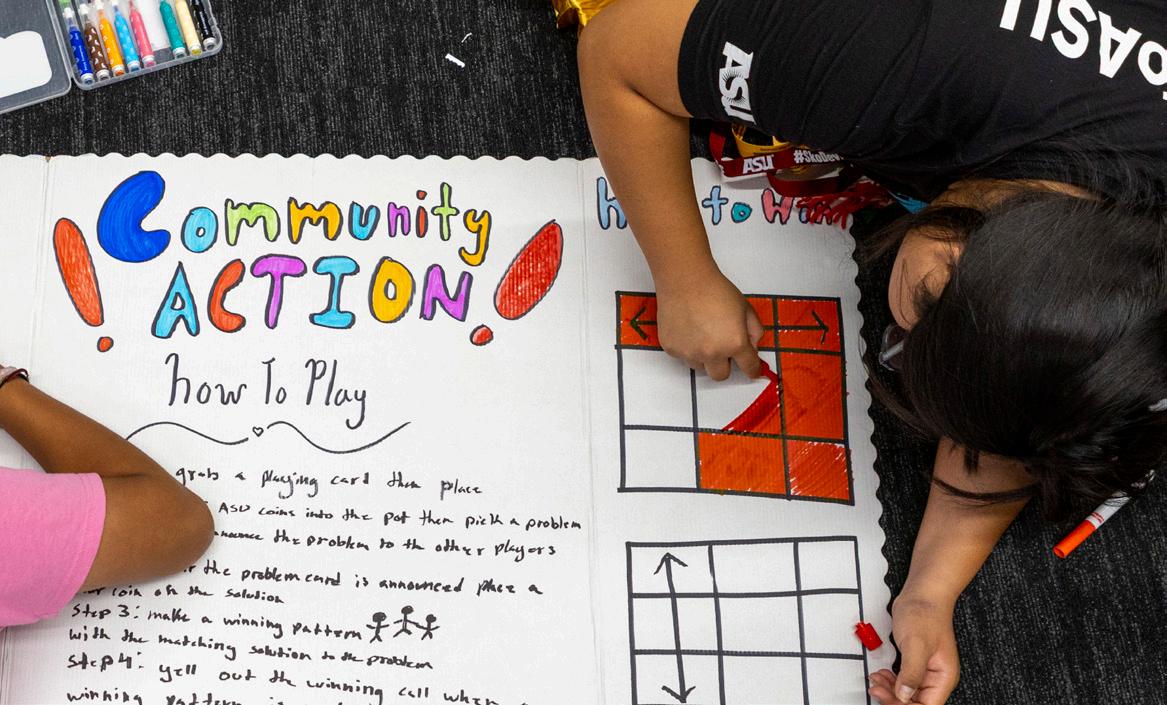
With your support, ASU can build a better criminal justice system — and create safer, healthier communities in Arizona and beyond.
This effort will take vision, hope and generosity from those who believe we can do better — for our country and for the people who live and work here. We can all agree the system needs fixing. And we can all help drive that change.
Through Changing Futures, we will reimagine criminal justice to create safe communities for all of us. Join us.
The Access ASU Summer Program works to increase the visibility of Indigenous professionals and academics and create awareness of criminal justice and public service careers.

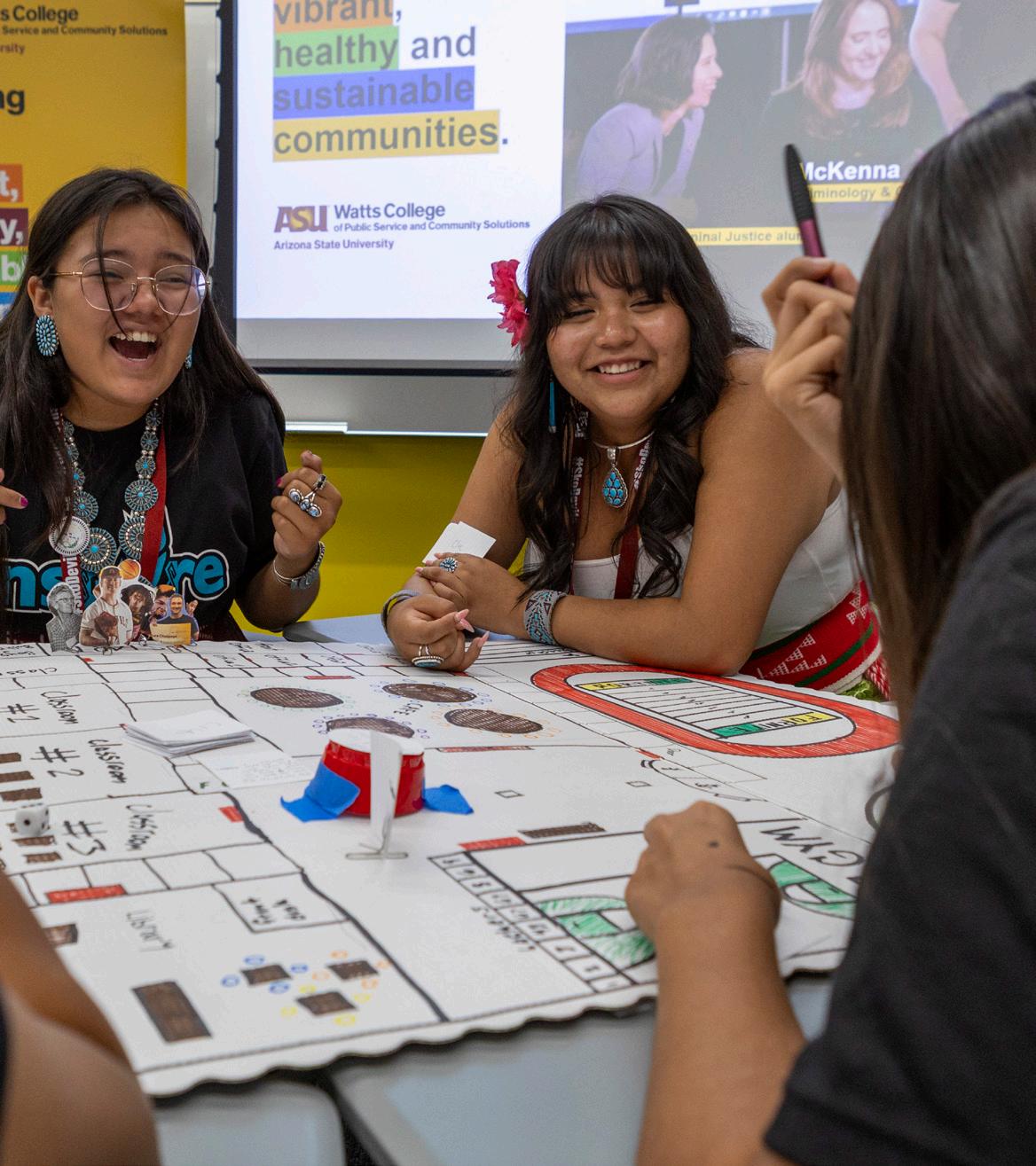
ASU is a comprehensive public research university, measured not by whom it excludes, but by whom it includes and how they succeed; advancing research and discovery of public value; and assuming fundamental responsibility for the economic, social, cultural and overall health of the communities it serves.